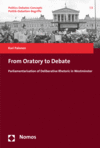From Oratory to Debate
Parliamentarisation of Deliberative Rhetoric in Westminster
Zusammenfassung
Neuere Studien zeigen ein reges Interesse an der Politik parlamentarischer Praktiken. Die These dieses Buchs liegt darin, als Folge der Parlamentarisierung der deliberativen Rhetorik eine Schwerpunktverlagerung von der Beredsamkeit zur Debatte anzunehmen. Parlamentsreden sind Interventionen in Debatten um Anträge auf der Tagesordnung und um die Agenda als solche.
Rhetorik- und Parlamentsstudien haben diesen Wandel und seine politische Bedeutung nur zögerlich erkannt. Das Buch analysiert die rhetorischen Schriften zum Westminster-Parlament vom späten 18. Jahrhundert bis zum Zweiten Weltkrieg. Es behandelt akademische und andere Außenseiter und ebenso mit dem Parlament vertraute Autoren (Sekretäre, Journalisten, Mitglieder). Neben einigen ‘realen’ Debatten erhalten John Stuart Mill und Walter Bagehot als prominente Parlamentstheoretiker besondere Beachtung. Die Prozedur und der Umgang mit der Zeit machen das Parlament zum Musterbeispiel einer pro et contra-Politik.
Abstract
Recent studies manifest a new interest in the politics of internal parliamentary practices. The book presents a thesis that a shift from oratory to debate characterises the parliamentarisation of deliberative rhetoric. Parliamentary speeches are intelligible only as political interventions pro et contra to debates on motions on the agenda and the agenda-setting itself.
Scholars of rhetoric and parliaments have been slow to recognise this shift and its political implications. The book analyses the rhetoric of Westminster-related writings from late 18th century to WWII among scholars and others outsiders in contrast to parliamentary insiders (officials, journalists, members). A special attention is given to John Stuart Mill and Walter Bagehot as the most prominent British parliamentary theorists and to cases studies on actual parliamentary debates. With its procedures and ways of dealing time the Westminster-style parliament is an exemplary political assembly of debating pro et contra.
- 1–12 Titelei/Inhaltsverzeichnis 1–12
- 13–26 1. Rhetoric as political action 13–26
- 1.1 Oratory and debate as forms of rhetoric
- 1.2 The singularity of parliamentary debate
- 1.3 Aims, questions and sources
- 1.4 The parliamentary variety of deliberative rhetoric
- 1.5 The story of parliamentarisation
- 27–62 2. The rise of parliamentary eloquence 27–62
- 2.1 Hegewisch on English parliamentary eloquence
- 2.1.1 Towards a debating parliament
- 2.1.2 Parliamentary eloquence after the Glorious Revolution
- 2.1.3 The elder Pitt as a British Demosthenes
- 2.1.4 Parliamentary eloquence as a counterweight to majority rule
- 2.2 Parliamentary eloquence in the eighteenth century
- 2.2.1 Parliamentary eloquence in scholarly works
- 2.2.2 Parliamentary advice-books
- 2.3 William Gerard Hamilton’s guidebook for debaters
- 2.3.1 Logic and rhetoric in parliament
- 2.3.2 The deliberative genre: concepts and audiences
- 2.3.3 Parliamentary history and procedure
- 2.4 Oratory and debate in the eighteenth century
- 63–94 3. Outsider perspectives on parliamentary speaking 63–94
- 3.1 The rise of parliamentary speech collections
- 3.1.1 The remembrance of great speeches: Chapman, Browne and Hazlitt
- 3.1.2 Parliamentary eloquence and political liberty
- 3.1.3 Non-thematisation of debate and procedure
- 3.1.4 Speech and debate in later collections
- 3.1.5 Rhetoric and politics in parliamentary speech collections
- 3.2 Parliamentary oratory and debate in the school rhetoric
- 3.2.1 Parliament and debate in the rhetorical introductions
- 3.2.2 Parliamentary politics in the debate manuals
- 3.3 Debate in oratory and oratory in debate
- 95–154 4. Insider views on parliamentary rhetoric and debate 95–154
- 4.1 Parliamentary journalism
- 4.1.1 Oratory and eloquence
- 4.1.2 Parliamentary and platform oratory
- 4.1.3 Quality of debate
- 4.1.4 Political conditions of debate
- 4.2 Parliamentary officials on debate
- 4.2.1 Oratory and debate in parliamentary politics
- 4.2.2 Debate under scarce parliamentary time
- 4.3 The conceptualisation of parliamentary debate among members
- 4.3.1 Parliamentary eloquence, oratory and rhetoric in the Hansard
- 4.3.2 Macaulay and the young Gladstone on parliamentary speaking
- 4.3.3 Rhetorical reflections of post-reform parliamentarians
- 4.3.4 Parliament and platform
- 4.3.5 Parliamentary debating as playing with time
- 4.4 Parliamentary debate and deliberative rhetoric
- 155–196 5. Political theories of parliamentary deliberation 155–196
- 5.1 Grote’s reinterpretation of ancient Greek rhetorical culture
- 5.2 Mill and Bagehot on the limits of rhetoric in parliamentary politics
- 5.3 Two rhetorical defences of parliamentary government
- 5.4 Rhetorical defences of liberty and novelty
- 5.5 Debate as the core of the parliamentary theory of politics
- 197–226 6. The Westminster practice of the rhetoric of debate 197–226
- 6.1 Procedural reforms as contexts of parliamentary self-reflection
- 6.2 Deliberation as a topos in the 1882 procedure reform
- 6.3 Deliberation as a topos in the 1914 procedure committee
- 6.4 Facing the governmentalisation of parliamentary rhetoric
- 227–242 7. Parliamentarisation of deliberative rhetoric 227–242
- 7.1 Parliamentary government and parliamentary rhetoric
- 7.2 Rhetoric of debating
- 7.3 Four aspects of parliamentary debate
- 243–256 References 243–256
- 257–262 Index 257–262


